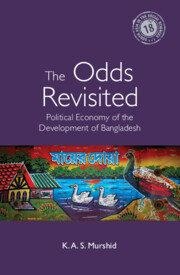Book contents
- Frontmatter
- Dedication
- Contents
- List of Tables and Figures
- Acknowledgements
- List of Abbreviations
- Introduction
- 1 A Bird’s-Eye View of the Bangladesh Economy: 1971–2020
- 2 Initial Conditions: The Odds Revisited
- 3 The Food Security Challenge
- 4 Exploring Transition and Change in the Rice Market
- 5 International Migration
- 6 The Rural Non-farm (RNF) Sector
- 7 Industrialization and the Rise of RMG
- 8 Industrialization: Other Stories
- 9 The Social Sector Puzzle
- 10 Dhaka: Capital Formation—Urbanization, Competition and the Rise of a Business Class
- Conclusion
- Notes
- Glossary
- References
- Index
10 - Dhaka: Capital Formation—Urbanization, Competition and the Rise of a Business Class
Published online by Cambridge University Press: 30 June 2022
- Frontmatter
- Dedication
- Contents
- List of Tables and Figures
- Acknowledgements
- List of Abbreviations
- Introduction
- 1 A Bird’s-Eye View of the Bangladesh Economy: 1971–2020
- 2 Initial Conditions: The Odds Revisited
- 3 The Food Security Challenge
- 4 Exploring Transition and Change in the Rice Market
- 5 International Migration
- 6 The Rural Non-farm (RNF) Sector
- 7 Industrialization and the Rise of RMG
- 8 Industrialization: Other Stories
- 9 The Social Sector Puzzle
- 10 Dhaka: Capital Formation—Urbanization, Competition and the Rise of a Business Class
- Conclusion
- Notes
- Glossary
- References
- Index
Summary
Introduction
The majority of modern activities and transactions are concentrated in the capital cities of developing countries: It is where the bulk of the formal sector employment is generated. This is also where one would encounter relatively more women in the labour market and, generally, a superior standard of living in terms of health and well-being, literacy, women's status, and social mobility, as well as access to public services. The capital is also where one would expect to find museums, art galleries, film industries, theatres, fashion houses, and other important cultural centres.
Many developing areas are undergoing rapid urbanization, and this has been particularly true for the city of Dhaka, the capital of Bangladesh, where rates of urbanization have been high. Such growth is not devoid of economic logic, as has been pointed out. Generally, high urbanization rates are a positive indication suggesting strong economic performance. Urbanization and city growth are caused by different factors, including rural–urban migration, natural population increase and horizontal expansion. However, the fundamental cause relates to patterns of economic expansion and structural transformation in the case of sustained urbanization as has been witnessed in Dhaka.
While urbanization is powering economic growth, it is also generating formidable challenges of management and sustainability. With forecasts that more than half of Bangladesh's population may be living in urban areas by 2040 from the current level of nearly 40 per cent, these challenges are set to become even more complex.
The story of urbanization in Bangladesh is mainly a story about Dhaka, its premier, indeed primate city and the centre of the administrative, political, cultural, and economic life of the country. There are other towns and cities as well, of which Chittagong in the southeast and Khulna in the southwest are the most important and serve as the country's maritime gateways to the world. Chittagong is much larger than Khulna and was given the name Porto Grande by the Portuguese and was once considered the most prosperous city in the ‘Kingdom of Bengala’ (Encyclopaedia Britannica 2021). This chapter, however, focuses mainly on Dhaka, which has become Asia's fastest-growing megacity in the 21st century, alone accounting for around 40 per cent of the national economic pie and more than a third of the nation's urban population (Afsar and Hossain 2020).
- Type
- Chapter
- Information
- The Odds RevisitedPolitical Economy of the Development of Bangladesh, pp. 171 - 216Publisher: Cambridge University PressPrint publication year: 2022

